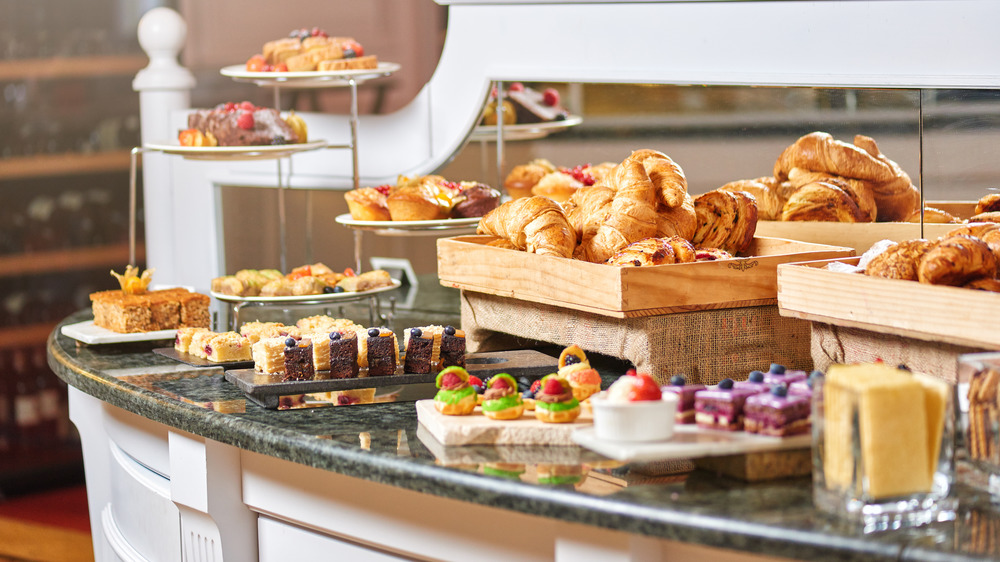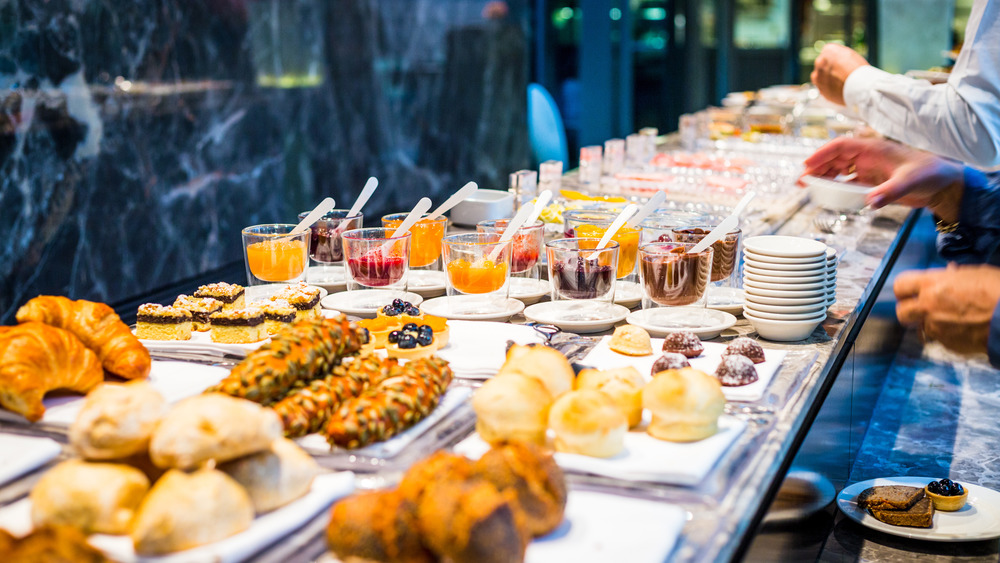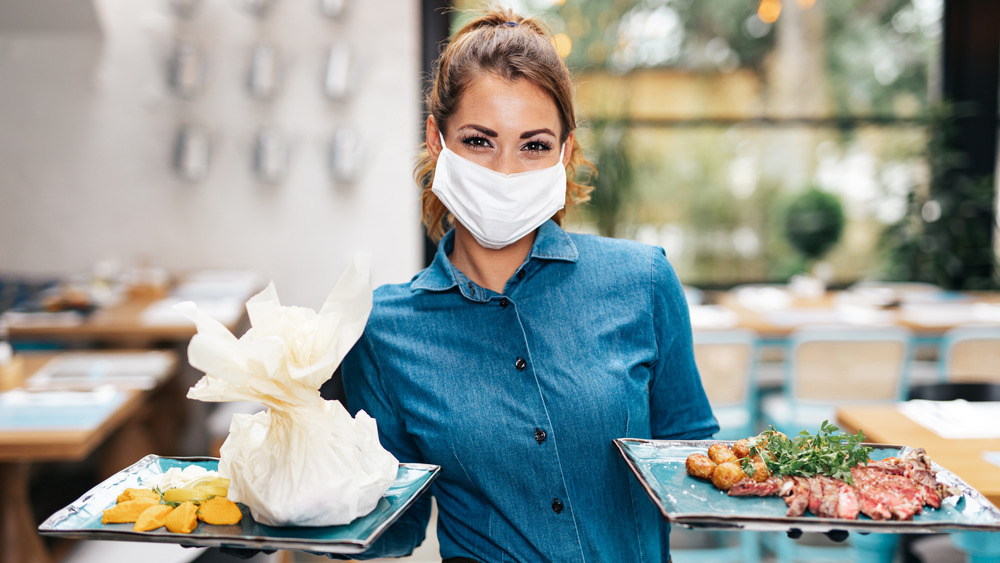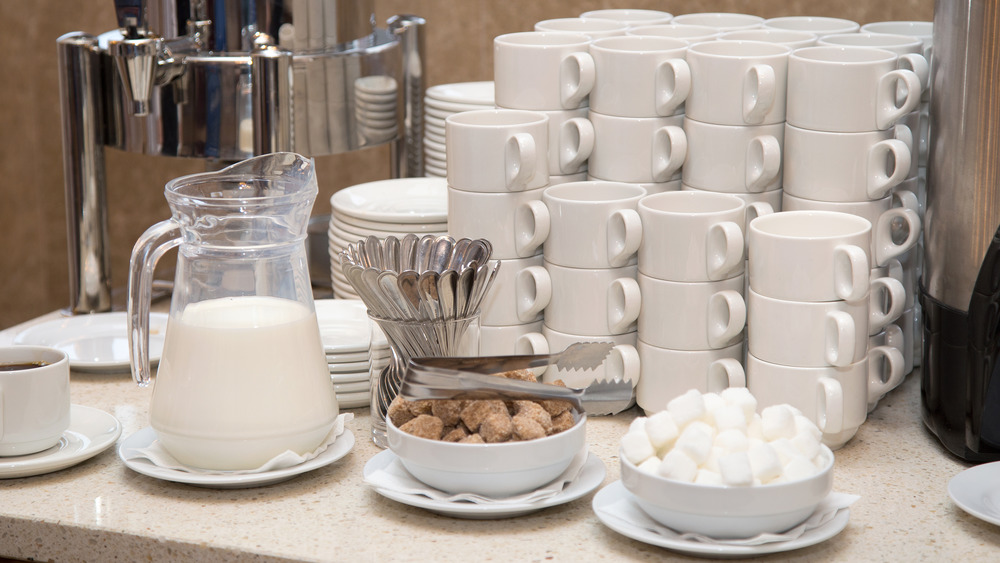The Truth About Hotel Breakfast Buffets
Waking up in a hotel often means waking up in a new city.
Hotel breakfast buffets are a common site in hotels around the world. As soon as you roll out of bed, your breakfast is ready for you when you want it, and it's included in your hotel stay. It's a comforting thought knowing that all of your favorite breakfast foods are an elevator's ride down to the lobby away — you can skip the hassle of pouring over restaurant reviews left by other disgruntled travelers and get straight to pouring your coffee instead. If you really wanted to, you could even show up in your PJs and nobody would say a thing. And, while their food offerings may vary depending where you end up, they all have several nice (and not so nice) truths in common.
Here are a few things you probably didn't know about hotel breakfast buffets.
The scrambled eggs are usually powdered
Scrambled eggs are a common sight at any breakfast buffet. Usually tucked away somewhere between a pile of greasy bacon and a heap of sausage links that have been soaking in a sticky mix of brown sugar and butter, you might be thinking that fresh scrambled eggs are the healthy option here. But if their unnaturally, bright yellow coloring and creepy spongy texture didn't already give it away, the scrambled eggs served at hotel breakfast bars aren't anything close to the kind you make at home on a Sunday morning, and they definitely weren't whipped up minutes before you scooped them onto your plate.
When made correctly, scrambled eggs require time, patience, and most importantly, fresh ingredients. At home, you can season them however you want, but the scrambled eggs served at hotel breakfast bars are intended to cater to the masses, which might mean two things: first, they may come cooked as-is, and two, powdered egg mix is usually used to make the final product, instead of freshly-cracked yolks. Hotels are frequented by a multitude of guests, and purchasing the "just add water" equivalent of a breakfast favorite is a lot cheaper than buying fresh eggs every morning. So, what's the solution if you've got your heart set on having scrambled eggs every morning? If the hotel you're staying at has a fresh omelet station, that's a sure way to guarantee that the eggs are the real deal.
The word "buffet" doesn't always mean buffet
If you've ever vacationed in North America or Europe, chances are, you've been enticed into booking a hotel that offers a free breakfast buffet every morning. Not having to pay for breakfast in an overpriced metropolitan city and then splurging extra at lunch? Amazing! But, depending where you go, the breakfast buffet could be closer to a continental style of fare.
In larger hotels it's common to find an assortment of breakfast classics in covered serving trays. But in smaller hotels, the breakfast selection might be lighter. What's even more confusing is that continental breakfasts can still be served "buffet style"—but instead of pancakes, bacon, and sausage, you're likely to find individual-sized yogurt, fruit salad, and bagels or toast. Continental breakfast buffets are popular at business hotels, where the majority of their guests are getting up early to attend morning meetings. Besides being a cheaper option for hotels, and a healthier option for guests, continental breakfast buffets allow guests to grab a quick bite to eat before heading out to start their day.
A lot of the food at hotel breakfast buffets is thrown out
We've all visited a buffet hungry and seen the carnage that plays out when our eyes are bigger than our stomachs. One too many spring rolls later and halfway through a slice of pizza, you realize you put too much on your plate.
Food waste is a major dilemma that happens in hotel breakfast buffets, too, where the appearance of all kinds of tourists means the hotel puts a variety of foods on rotation to suit individual needs or requests. Some guests will make themselves a small breakfast plate and eat every last crumb. Some will create a giant heap and take only a few bites and walk away. Others might just have a coffee and a muffin.
In the majority of cases, hotels have no way of knowing their guests' eating habits, and must therefore have an assortment of breakfast foods for their guests, and continue preparing it and keeping it hot, even if nobody is eating it. Plus, when you're not actually paying for your breakfast, you're less likely to feel bad about wasting it once it goes in the garbage.
You have to wake up early if you want to get the good stuff at a hotel breakfast buffet
The best part about vacation is ditching your routine and finally sleeping in. But, if you booked a room at a hotel with a free breakfast buffet, you'll actually have to decide if that waffle station is worth sacrificing beauty sleep over, because breakfast buffets close a lot earlier than you'd think.
A lot of hotels start serving breakfast from as early as 6 a.m. and they typically end by 10 a.m. at the latest. If you're staying at an all-inclusive resort, this might sound crazy, but for boutique hotels, it makes a lot of sense. Most travelers are early risers who are eager to make the most of their time in a new city. Hotels usually recognize that their guests don't want to wait around all morning to grab a bite to eat, so breakfast starts early for those who want it.
The large time window also ensures that guests who do wish to get a few more hours of shut-eye can still have breakfast at a reasonable hour. Another reason breakfast buffets at hotels start early is because depending on where you're staying, checkout can be anywhere from 10 a.m. to 12 p.m. Serving breakfast early allows guests to have enough time to eat between waking up and packing up their belongings, too.
A lot of people have probably touched your food
Food contamination has always been a touchy subject for buffets. Before the Plexiglass barriers and social distancing protocols were enacted, it was normal to see people reaching over food platters and using the same set of tongs to put items on their plate. If somebody sneezes or coughs, it's easy for those transfer droplets to settle on food that's left out in the open, which makes breakfast buffets a hotspot for bacteria and germs. Seeing somebody pick up a piece of food and put it back shouldn't be a thing, but it is, and it happens quite often. Cross-contamination can happen from the minute the food leaves the hotel kitchen until you pick it up and put it on your plate. Buffets are full of high-transfer touchpoints like tongs, juice jugs, silverware, and lids, and when you consider the fact that some guests prefer to grab food with their hands, it's pretty gross to think about what might be on your food by the time it reaches your plate.
COVID-19 has eliminated a lot of hotel breakfast buffets
Remember when waiting in a long line of people, reaching over heaps of food, and passing a set of sticky tongs to the next person was considered normal? The arrival of the COVID-19 pandemic and its health and safety protocols has forced many hotels and resorts to either close down or rethink their breakfast buffet offerings. Social distancing measures, like keeping six feet apart from other guests makes it hard for buffets to operate as they normally would, and à la carte menus are the new solution, where guests can choose a selection of breakfast foods and hotel staff will serve them at their table.
To eliminate excess transfer touchpoints, à la carte dining is now the new norm, usually for the same price. There are some breakfast buffets that can still exist, but only if strict health and safety protocols are followed. Food that's been sitting out exposed to various people is unfortunately a breeding ground for a virus, and as such, strict health measures must be taken to protect guests and staff. Self-serve style, for example, has been eliminated and now, hotel staff behind Plexiglass barriers place the food you want on your plate. Social distancing signage also ensures guests do not crowd the serving stations, and depending on where you go, face masks must be worn and only taken off while eating and drinking.
Things that are supposed to be in the fridge usually aren't
Despite being left out in a warming tray, the scrambled eggs, fried potatoes, and bacon you find at a hotel breakfast buffet are perfectly safe to eat. But what about coffee creamers, butter packets, cream cheese, and yogurt? At home, you'd keep these items in the fridge, but hotel buffets generally opt to put dishes with perishables on ice to retain the cold temperature.
According to the FDA, foods that require refrigeration, like dairy, need to be kept at 40 degrees Fahrenheit or colder. If they become room temperature, they must be discarded after two hours. Hotel staff should be present and recording the food temperatures from time to time. Eating foods that have been sitting out for too long can make you seriously sick. As a general rule of thumb, make sure that anything that should be cold is actually sitting on ice, and not just a pool of water. When in doubt, don't eat it!
If you're not a guest of the hotel, you can still have breakfast
Have you ever walked into a hotel lobby bar and stayed for a drink, even though you're not staying the night? The same thing can be said for hotel breakfast buffets. Many hotels that operate with a breakfast, lunch, or dinner buffet, open their doors to the public as well. Maybe you've heard of a famous egg sandwich that can only be had at a hotel down the street. Or, maybe you'd like your friends to join you for breakfast the next day. More often than not, hotels will simply charge a fee for non-guests, or for guests who opted out of the breakfast package during booking.
The IHOP in Niagara Falls, for example, is attached to the Ramada Fallsview hotel, but everybody is allowed to come in and enjoy the world-famous pancakes regardless of whether or not they're a guest of the hotel. A breakfast buffet is never the only option for guests; if the dining room is open, they can likely order room service or off of an à la carte menu. Hotels with full service restaurants operate on breakfast, lunch, and dinner hours just like traditional restaurants that offer service to anybody eager to have a seat at the table, so not being a guest of the hotel isn't a deal breaker. Always check with the hotel you're staying at ahead of time!








